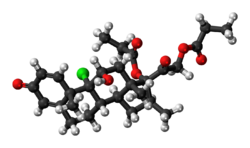Chemistry:Beclometasone dipropionate
 | |
 | |
| Clinical data | |
|---|---|
| Trade names | Qvar, Beconase AQ, others |
| AHFS/Drugs.com | Monograph |
| MedlinePlus | a681047 |
| Pregnancy category |
|
| Routes of administration | inhalation, nasal, topical |
| ATC code | |
| Legal status | |
| Legal status | |
| Pharmacokinetic data | |
| Bioavailability | Converted to beclometasone-17-monopropionate (17-BMP) during absorption |
| Protein binding | 87% of 17-BMP to albumin and transcortin |
| Metabolism | By esterase enzymes found in most tissues |
| Elimination half-life | 2.8 hours |
| Excretion | Biliary (60%), renal (12%) |
| Identifiers | |
| |
| CAS Number | |
| PubChem CID | |
| IUPHAR/BPS | |
| DrugBank | |
| ChemSpider | |
| UNII | |
| ChEBI | |
| ChEMBL | |
| Chemical and physical data | |
| Formula | C28H37ClO7 |
| Molar mass | 521.042 g/mol g·mol−1 |
| 3D model (JSmol) | |
| |
| |
| | |
Beclometasone dipropionate, also spelled beclomethasone dipropionate and sold under the brand name Qvar among others, is a steroid medication.[1] It is available as an inhaler, cream, pills, and nasal spray.[2] The inhaled form is used in the long-term management of asthma.[1] The cream may be used for dermatitis and psoriasis.[3] The pills have been used to treat ulcerative colitis.[4] The nasal spray is used to treat allergic rhinitis and nasal polyps.[5]
Common side effects with the inhaled form include respiratory infections, headaches, and throat inflammation.[1] Serious side effects include an increased risk of infection, cataracts, Cushing’s syndrome, and severe allergic reactions.[1] Long-term use of the pill form may cause adrenal insufficiency.[4] The pills may also cause mood or personality changes.[4] The inhaled form is generally regarded as safe in pregnancy.[6] Beclometasone is mainly a glucocorticoid.[1]
Beclometasone dipropionate was first patented in 1962 and used medically in 1972.[7] It was approved for medical use in the United States in 1976.[1] It is on the World Health Organization's List of Essential Medicines, the most effective and safe medicines needed in a health system.[8] The wholesale price in the developing world for an inhaler containing 200 doses of medication is about 3.20 USD as of 2014.[9] In the United States it costs between 50 and 100 USD for a typical month supply of the inhaled form.[10]
Side effects
Occasionally, it may cause a cough upon inhalation. Deposition on the tongue and throat may promote oral candidiasis, which appears as a white coating, possibly with irritation.[11][12][13] This may usually be prevented by rinsing the mouth with water after using the inhaler. Other adverse drug reaction side effects may rarely include: a smell similar to burning plastic, unpleasant taste, hoarseness or nasal congestion, pain or headache, and visual changes. Allergic reactions may occur, but rarely.
Nasal corticosteroids may be associated with central serous retinopathy.[14]
Names
Beclometasone dipropionate is the INN modified and beclomethasone dipropionate is the USAN and former BAN. It is a prodrug of the free form, beclometasone (INN).
Clenil, Qvar are brandnames for the inhalers. Beconase, Alanase, Vancenase, Qnasl for the nasal spray or aerosol.
References
- ↑ 1.0 1.1 1.2 1.3 1.4 1.5 "Beclomethasone Dipropionate". The American Society of Health-System Pharmacists. Archived from the original on 2015-12-08. https://web.archive.org/web/20151208145637/http://www.drugs.com/monograph/beclomethasone-dipropionate.html. Retrieved Dec 2, 2015.
- ↑ "List of products: BECLOMETASONE DIPROPIONATE". Archived from the original on 8 December 2015. https://web.archive.org/web/20151208113019/http://www.mhra.gov.uk/spc-pil/?subsName=BECLOMETASONE%20DIPROPIONATE&pageID=SecondLevel. Retrieved 6 December 2015.
- ↑ "Beclometasone dipropionate 0.25 mg/g Cream". Archived from the original on 8 December 2015. https://web.archive.org/web/20151208111605/http://www.mhra.gov.uk/home/groups/spcpil/documents/spcpil/con1444971110586.pdf. Retrieved 6 December 2015.
- ↑ 4.0 4.1 4.2 "Clipper". Archived from the original on 8 December 2015. https://web.archive.org/web/20151208154434/http://www.mhra.gov.uk/home/groups/spcpil/documents/spcpil/con1353302219931.pdf. Retrieved 6 December 2015.
- ↑ "Beclomethasone Dipropionate eent". The American Society of Health-System Pharmacists. Archived from the original on 2015-12-08. https://web.archive.org/web/20151208200147/http://www.drugs.com/monograph/beclomethasone-dipropionate-eent.html. Retrieved Dec 2, 2015.
- ↑ Hamilton, Richart (2015). Tarascon Pocket Pharmacopoeia 2015 Deluxe Lab-Coat Edition. Jones & Bartlett Learning. p. 349. ISBN 9781284057560.
- ↑ McPherson, Edwin M. (2007). Pharmaceutical Manufacturing Encyclopedia. (3rd ed.). Burlington: Elsevier. p. 539. ISBN 9780815518563. https://books.google.ca/books?id=_J2ti4EkYpkC&pg=PA539.
- ↑ "WHO Model List of Essential Medicines (19th List)". World Health Organization. April 2015. Archived from the original on 13 December 2016. https://web.archive.org/web/20161213052708/http://www.who.int/medicines/publications/essentialmedicines/EML_2015_FINAL_amended_NOV2015.pdf?ua=1. Retrieved 8 December 2016.
- ↑ "Beclometasone". http://mshpriceguide.org/en/single-drug-information/?DMFId=1004&searchYear=2014. Retrieved 6 December 2015.
- ↑ Hamilton, Richart (2015). Tarascon Pocket Pharmacopoeia 2015 Deluxe Lab-Coat Edition. Jones & Bartlett Learning. p. 451. ISBN 9781284057560.
- ↑ "Beclomethasone dipropionate aerosol and oropharyngeal candidiasis". Br J Dis Chest 70 (1): 32–8. 1976. doi:10.1016/0007-0971(76)90004-8. PMID 1259918.
- ↑ "Oropharyngeal candidiasis in patients treated with beclomethasone dipropionate delivered by metered-dose inhaler alone and with Aerochamber". J Allergy Clin Immunol 81 (2): 424–8. 1988. doi:10.1016/0091-6749(88)90911-6. PMID 3339197.
- ↑ "Oral candidiasis associated with inhaled corticosteroid use: comparison of fluticasone and beclomethasone". Ann Allergy Asthma Immunol 90 (6): 646–51. 2003. doi:10.1016/S1081-1206(10)61870-4. PMID 12839324.
- ↑ "Central serous chorioretinopathy associated with inhaled or intranasal corticosteroids". Ophthalmology 104 (10): 1653–60. October 1997. doi:10.1016/s0161-6420(97)30082-7. PMID 9331207.

